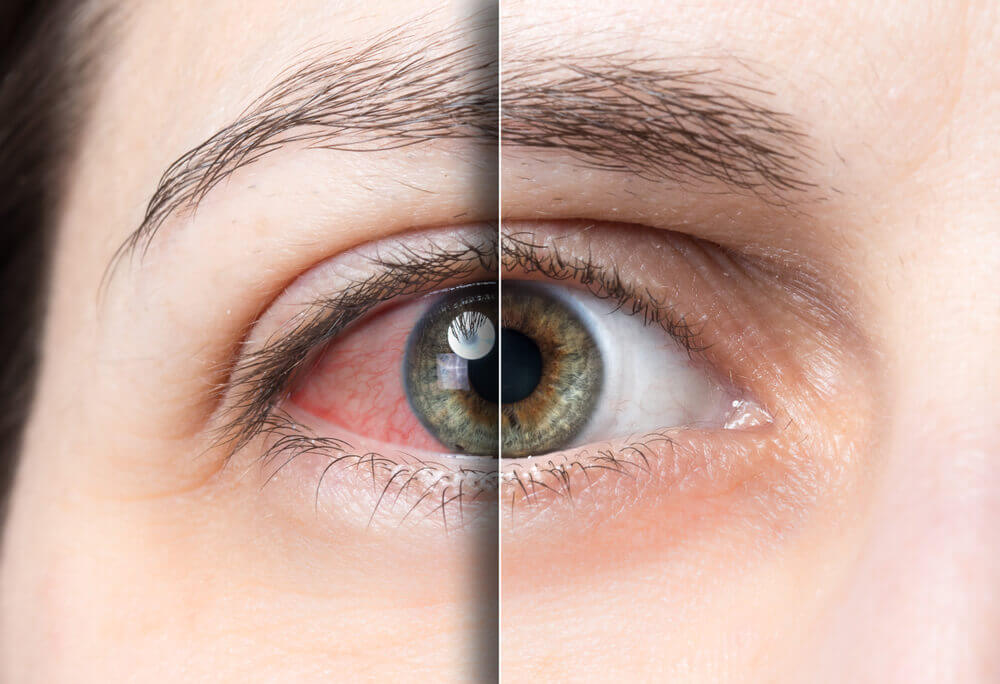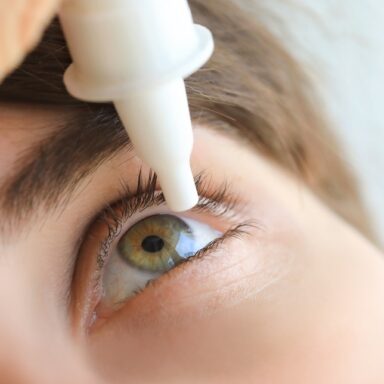Blinking, squinting, wiping and straining to read this? Then you’ll know just how annoying blurry and watery eyes can be! But, they’re not just mildly irritating physically and mentally, they can be dangerous too, for example if you’re driving, operating heavy machinery or if it’s a symptom of an underlying health condition such as an autoimmune disease. So, ditch the stiff upper lip, squint and smeary cheeks, and make sure you read on to find out what’s going on and how to get it treated.
Common causes of blurred vision
Often blurry eyes are a minor complain, nothing serious to worry about, and easily treatable.1-3
Here’s some of the most common culprits – they’re usually minor and can mostly be treated at home or with over-the-counter medication:
- Dry eyes – itchy, gritty feeling, red, sensitive or watery eyes1
- Allergies –itchy, swollen eyelids, redness, worse in spring/summer (seasonal allergies) – Read is it hay fever or dry eye?4
- Migraine – blurred vision for around 10 – 30 minutes, followed by an intense headache5
- Eye infection – e.g. conjunctivitis: irritation, mucus or pus discharge, crusting of eyelid, swelling6
- Eye strain / tiredness – burning feeling, sore neck, shoulder or back, difficulty concentrating7
- Common cold / virus – steaming eyes, runny nose, low-grade fever, cough, tickly throat8
- Blepharitis – swollen eyelids, dandruff like flakes around eyelashes9
- Stye – red swollen bump on edge of the eyelid (see your doctor asap if it causes blurry vision)10
- Trauma – e.g. corneal abrasion (superficial scratch on front surface of eye) (for serious eye injuries go to A&E and seek immediate medical advice!)11
- Astigmatism – when your cornea or lens has a different shape than normal, so you need glasses / contact lenses to correct it (make sure you see your optician for an eye exam)12

Common age-related causes:
- The menopause – hot flushes, night sweats, dry eyes, migraines, muscle aches3,14
- Presbyopia – affects middle-aged and older people, trouble seeing things up close15
- Age-related cataract – common between 40-50 years old, cloudy and blurry vision16,17
- Glaucoma – over 60s most at risk, gradual blurred vision18
- Tear duct problem – babies often have watering eyes because their tear ducts are small, which usually resolves on it’s own19
- Age-related macular degeneration – over 50s most at risk, loss of central vision20
- Detached retina – floaters, flashes of light, shadow in vision (risk increases as you get older)21

More serious but rarer causes:
- Preeclampsia – affects some pregnant women from 20 weeks, high blood pressure22
- Diabetes – high blood sugar, thirsty, weight loss, peeing frequently, tiredness23
- Psoriasis – eye pain and redness, red scaly patches of skin, joint pain24
- Multiple Sclerosis (MS) – dim vision, loss of colour, aching with eye movement, double vision, involuntary shaking of the eyes25
- Other Autoimmune conditions, like rheumatoid arthritis, sarcoidosis or Sjögren’s Syndrome1,26
- Bell’s palsy – a temporary weakness to one side of the face27
- Ocular herpes – eye redness, eye pain, blister or rash around eye, swollen eyelid28
- Parkinson’s – double vision, dry eye, trouble reading, difficulty voluntarily opening the eye29
- Carbon monoxide poisoning – nausea, vomiting, confusion30
- Concussion – injury to the head, confusion, temporary memory loss, dizziness, nausea31
- Stroke – slurred speech, face dropped on one side, weakness or numbness in arms32
Did you know?
Sudden changes to eyesight aren’t normal. You should go to A&E immediately if you suddenly have blurry vision, double vision, or loss of vision. That can be a sign of stroke or other serious illness.33

Top tip
If you’re regularly experiencing unexplained blurry vision, it’s important to get it checked out by a doctor especially if it’s getting worse over time.
Can dry eyes cause blurred vision?
The symptoms of dry eye often include blurry vision and that’s because of two reasons:
- Many things that trigger dry eye can also make your eyes blurry, such as:
a. Two much screen time1
b. The environment, such as exposure to wind, sun, air conditioning, smoke and allergens or irritants1,34,35
c. Long term contact lens wearing35
d. Poor diet – lacking in vitamin A or not drinking enough water35
e. Side effects from certain medications35
f. An underlying health condition like the ones listed above - Dry eye can make your eyes overly watery.1It’s counterintuitive, but dry eye can lead to your glands overcompensating and producing too many tears that spill out over your cheeks.36
Top tip
Just remember that watery eyes can also be caused by other things too, such as allergies, wind and the common cold.8,35
How do I know if it’s dry eye, what’s the symptoms?
Aside from blurry vision, your eyes may feel itchy, gritty or scratchy, like they are stinging or burning or as if there’s something in your eye.34 They might look red too and sometimes they might be overly watery.1Both eyes are usually affected.34
You can read more in depth about dry eye symptoms in our dedicated blogs and page about it.
Remember, dry eye is very common, particularly among older people: Up to a third of people aged 65 or older have dry eye symptoms.37 You’re also more at risk if your female or if you wear contact lenses.37
Treating blurry eyes
Because there are so many causes of blurry eye, treating it will depend on the root cause. In many cases it may be caused by dry eye or linked to something that causes dry eye such as eye strain, the menopause, and certain autoimmune conditions.7,13,14,26,37
In these cases, treating the symptoms of dry eye may help you regain your focus!
Eye drops – also known as artificial tears – are the simple go-to option for managing the symptoms of dry eye.1You’ll easily find them at your local pharmacy or can purchase them online and conveniently get them delivered to your door.

Always read the label.
If you are unsure of your symptoms or diagnosis please speak to your doctor or pharmacist.





